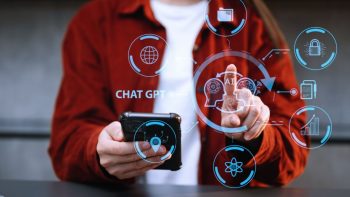
Imagine a world where your fridge knows when you’re out of milk and orders it for you, where your car drives you to work while you catch up on your favorite show, and where your personal assistant is not a person at all. Sounds a bit like science fiction, right? Well, it’s quickly becoming our reality thanks to artificial intelligence, or AI for short.
The rise of AI is definitely exciting, and it’s going to make a lot of things in our lives easier and more efficient. But it’s also important to think about the ways it could affect our privacy, our jobs, and our ethical principles. Like any tool, the impact of AI on our lives will depend on how we choose to use it. As we stand on the brink of this AI-driven era, it’s crucial to balance innovation with careful consideration of these broader implications.
What Exactly Is AI?
In simple terms, AI is a type of computer technology that’s designed to think and learn like a human. It’s what allows your smartphone to recognize your face or your voice assistant to understand your questions. AI is all about creating machines that can solve problems and make decisions on their own.
AI in Daily Life
You might not realize it, but AI is all around us. It’s in our homes, our phones, our schools, and our workplaces. Here are just a few ways AI has started to become a part of our daily lives:
- Smart Homes and Appliances: Devices like Google Home and Amazon Alexa can control your lights, thermostat, and even your coffee maker. They learn your routines and adjust your home environment to suit your preferences. Refrigerators can track your groceries and suggest recipes based on what’s inside. Vacuum cleaners can remember the layout of your home and clean more efficiently each time.
- Online Shopping: Ever wondered how online stores seem to know exactly what you want? AI uses your browsing and purchase history to predict what products you might like and shows you ads for those products.
- Navigation: Apps like Google Maps use AI to analyze traffic in real-time and suggest the quickest routes to your destination.
- Personal Assistants: Beyond simple tasks like setting alarms or playing music, AI personal assistants help manage emails, schedule appointments, and even make restaurant reservations without human intervention.
- Healthcare: AI technologies assist in early diagnosis and personalized medicine. For instance, AI algorithms analyze medical images more quickly and sometimes more accurately than human radiologists. Additionally, AI-driven chatbots provide basic health monitoring and advice, making healthcare more accessible.
- Transportation: Autonomous vehicles, such as self-driving cars and drones, are becoming more common. AI in public transportation can optimize routes and schedules, reducing wait times and energy usage.
- Banking and Finance: AI detects fraudulent transactions almost instantaneously, which is far faster than manual processing. AI also powers chatbots that help with customer inquiries and banking operations, like transferring money or checking account balances.
AI’s Transformation of the Workplace
AI’s integration into the workplace is reshaping job roles and industries, leading to both displacement and the creation of new opportunities:
- Manufacturing: In factories, AI-driven robots perform tasks that are dangerous or repetitive, increasing safety and efficiency. This technology allows human workers to focus on more complex and strategic tasks, although it also shifts the demand towards more technically skilled labor.
- Retail: AI predicts buying trends and automates checkouts to manage inventory and improve customer experiences. This reduces the need for human cashiers and stock clerks, prompting a shift towards more customer service-focused roles or tech maintenance jobs.
- Human Resources: AI streamlines recruitment by scanning resumes and identifying the best candidates for a position based on criteria learned from historical hiring data. This can improve the hiring process but also raises concerns about AI potentially perpetuating biases present in the data it learns from.
- Journalism and Content Creation: AI tools generate financial reports, sports updates, and even basic news articles. This frees up human journalists to tackle more complex stories, though it also pressures media professionals to adapt to new tools and skills.
- Education and Training: AI customizes learning experiences based on individual student needs and progress, which could transform educators from information deliverers to facilitators of student learning and problem-solving.
The Cool (and Not So Cool) Future of AI
As AI technology improves, its role in our lives is set to grow. Here are some exciting possibilities and some potential concerns:
The Exciting Stuff:
- Healthcare: AI can help doctors diagnose diseases faster and more accurately. It might even be able to predict future health issues based on your DNA.
- Education: AI tutors could provide personalized learning plans for students, helping them to master subjects at their own pace.
- Environment: AI could optimize energy use in homes and businesses, helping to reduce our carbon footprint.
- Personalized Entertainment: AI is already recommending shows on Netflix based on your viewing history, but the future could see AI curating entirely personalized media—like music that adapts to your mood or interactive movies where the plot changes based on your choices.
- Smart Cities: AI can manage traffic flow in real time, significantly reducing congestion and pollution. Streetlights, public transport, and emergency services could all be optimized to work in harmony, making city living more efficient and safer.
- Agriculture: AI-driven technologies can monitor crop health, predict weather patterns, and manage irrigation, significantly increasing food production with less waste and lower costs.
- Financial Management: AI can help individuals manage their finances by suggesting when to save, invest, or make payments. On a larger scale, AI can detect fraud more efficiently than humans, protecting your money from scams.
The Concerns:
- Privacy: With AI devices collecting all sorts of data about you, there’s a big question about how this information is used and who can access it.
- Job Security: As AI takes over more tasks, there are worries about jobs being lost. What happens when machines can do most of the work?
- Bias and Discrimination: AI systems learn from data that may contain human biases. If not carefully monitored, AI can perpetuate or even worsen discrimination based on race, gender, or age. For example, facial recognition technologies have been found to have higher error rates for people of color.
- Loss of Human Interaction: As AI takes over more services like customer support or care for the elderly, there’s a risk that we lose valuable human interaction in our lives. The nuances of human empathy and understanding cannot always be replicated by machines.
- Surveillance and Control: Governments and large corporations could use AI to monitor individuals at an unprecedented scale. This raises concerns about a surveillance state and the potential for controlling behaviors and opinions.
- Dependence on Technology: Increased reliance on AI might lead to diminished human skills and abilities. For example, if navigation apps always tell us where to go, we might stop learning how to navigate the world on our own.
- Ethical Decision-Making: As AI systems make more decisions, the question of how they make these decisions becomes crucial. Should we allow AI to make decisions about healthcare, criminal justice, or finance? And who is responsible when AI makes a mistake? In scenarios involving life and death, such as autonomous driving accidents, how do we program morality into AI? And who is ultimately accountable for these decisions?



